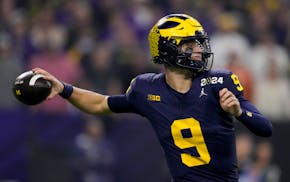At some point this season, Ricky Rubio might dribble behind his back and flick a no-look pass to Kevin Love, who might drain a three-pointer from the corner, eliciting what might be an ungodly roar from what might be a sold-out Target Center.
Until that hungered-for and entirely plausible hope becomes reality, the star of the 2012-13 Minnesota Timberwolves might be a man of a certain age wearing a suit jacket, but not always a tie, who sits over by, and benefits by sartorial comparison to, team owner Glen Taylor.
When Rubio recovers from knee surgery and Love from the NBA's first-ever knuckle-pushup multiple fracture, Rick Adelman stands as this team's reason to believe.
When's the last time you could say that about a Timberwolves coach? I'll save you time. You don't have to look it up. The answer is: never.
Never before has a Timberwolves coach mattered so much.
Bill Musselman was a fine grinder of a coach, but it was his job to goad the baby Wolves to 20 victories a year. The Wolves pretended to no serious aspirations in place when Mussy ran the show.
Jimmy Rodgers was to coaching what cats on YouTube are to acting.
Sidney Lowe was neither the problem nor the solution.
Flip Saunders was the most accomplished coach in Wolves history before Adelman arrived, and his fortunes were entirely entwined with Kevin Garnett's performances and moods.
Bill Blair thought he wanted to be an NBA head coach. Then he met J.R. Rider.
Kevin McHale brought knowledge and an ability to communicate with players, but he really only wanted to coach the home games. Hours after taking over for the second time, he complained about getting into Denver late at night. Your leader can't complain about travel.
Dwane Casey, given the circumstances, might have done the best coaching job in Wolves history, which proved to be a fireable offense under Taylor and McHale.
Randy Wittman was so bad I predicted that no real NBA franchise would ever hire him as a head coach, which remains accurate to this day.
Kurt Rambis was to coaching what juice boxes are to Cristal.
Which brings us to Adelman.
He's coaching a team that collapsed after Rubio got hurt last year. He's coaching without his superstar. He's coaching an odd assortment of aging veterans and unproven youngsters, several of whom will be asked to play out of position.
Under Adelman, this team will be better than you think. And it will be better than you think because the NBA is much more about intelligence than the league's detractors will ever admit.
Andrei Kirilenko and Brandon Roy are the kind of smart, versatile veterans who will thrive in Adelman's passing game. Chase Budinger and Derrick Williams are the kind of spry athletes who should score efficiently in his offense. Alexey Shved and J.J. Barea should succeed by driving and finding open teammates. Rubio and Love should find a surprisingly functional team when they return to the court.
Last year, Adelman was forced to manage a roster filled with problems in a season with a shortened training camp and little practice time between games. He had to rely on Love's scoring and Rubio's passing. His alternative was to rely on destructive players such as Michael Beasley, Wes Johnson, Darko Milicic and Anthony Randolph.
While the Wolves will be less of a team without Rubio and Love, they will benefit more than you might think from their roster makeover. Roy instead of Beasley? Add 100 points to the team's basketball IQ. Kirilenko instead of Randolph? Add another 100 and replace a scowl with a winning personality. Chase Budinger for Johnson? Imagine: A swing man who can dribble and shoot. Player X instead of Darko? A scarecrow would be an improvement.
With Adelman running his offense with a bunch of smart, unselfish players, we could see beautiful basketball all season at Target Center, even before Love and Rubio return.
Jim Souhan can be heard Sundays from 10 a.m. to noon and weekdays at 2 p.m. on 1500-AM. His Twitter name is SouhanStrib. jsouhan@startribune.com

Souhan: Wolves fans made Game 1 special. Now bring on Game 2.

Souhan: Should Vikings even consider McCarthy in NFL draft?

Souhan: NAW erases Suns' lead, Game 1 advantage with big performance

Souhan: This is KAT's chance to prove Flip Saunders was right

